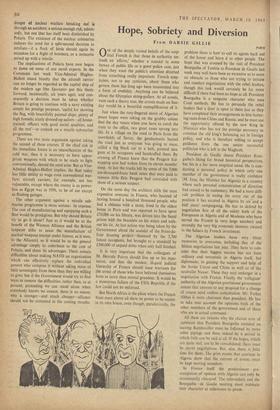Hope, Sobriety and Diversion
From DARSIE GILLIE ONE of the deeply rooted beliefs of the scep- tical French is that those in authority un- leash an 'affaire,' whether a scandal in some byway of public life or a great police case, just when they want the public's attention diverted from something really important. French scep- ticism, not to say cynicism, about those who govern them has long ago been transmuted into a form of credulity. Anything can be believed about the Olympian string-pullers. At all events, were such a theory true, the arrests made on Sun- day would be a beautiful exemplification of it.
Just when the rosy-fingered dawn of Algerian peace hopes were taking on the grubby colour that the day wears when you have to catch the train to the office, two great cases sprang into life. In a village on the road to Paris from the snowfields of Savoy, the gendarmerie barred the road just as everyone was going to mass, called a big black car to a halt, pointed sten guns at its occupants and handcuffed them. By evening all France knew that the Peugeot kid- napping case had woken from its eleven months'. sleep. At last the tracks left by some of the 5,000 ten-thousand-franc bank notes that were paid to ransom little Eric Peugeot had coincided with those of a serious suspect.
On the same day the architect with the most expensive overcoat in France, who boasted of having housed a hundred thousand people, who had a château with a moat, lived in the oldest house in Paris and was reported to have spent £70,000 on his library, was driven into the Sante prison with the bracelets on his wrists and with- out his tie. At last action was being taken by the Government about the scandal of the Point-du- Jour housing project—financed by the 2,700 future occupants, but brought to a standstill by £500,000 of unpaid debts when only half finished.
It is very important that the colleagues of M. Hercule Poirot should live up to his repu- tation, and that the modest, ill-paid judicial hierarchy of France should issue warrants for the arrest of those who have believed themselves born to more than mortal grandeur. It would be a monstrous failure of the Fifth Republic if the Jaw could not be enforced.
But North Africa is the place where the French State must above all show its power to be master in its own house, even though, paradoxically, the problem there is how to call its agents back out of the house and leave it to other people The hope that was aroused by the visit of President Bourguiba of Tunisia to President de Gaulle last week may well have been so excessive as to seem an obstacle to those who are trying to initiate and conduct negotiations with the rebel leaders, though this task would certainly be far more difficult if there had been no hope at all. President Bourguiba is a sanguine character who uses Coud methods. He has to persuade the rebel leaders that a door is open to them just as they have completed their arrangements to hire batter- ing rams from China and Russia; and he must use the opportunity offered by the new King in Morocco who has not the prestige necessary to continue the old king's balancing act in foreign policy, and who is therefore willing to accept guidance from the one senior successful politician who is left in the Maghreb.
President de Gaulle shares President Bout- guiba's liking for broad historical perspectives, but his is a far more sceptical mind. He is con- ducting a personal policy in which only one member of the government is really confident (M. Joxe, the Minister for Algeria) in a country where such personal concentration of direction had ceased to be customary. He had a most diffi- cult problem in easing the army out of the position it has secured in Algeria by six and a half years' campaigning. He has to defend by negotiation first of all the safety both of the Europeans in Algeria and of Moslems who have served the French (a very, large number) and secondly the very big economic interests created in the Sahara by French investment.
The Algerian leaders have very, bitter memories to overcome, including that of the Melun negotiations last year. They have to con- sider that their biggest success has not been military and terroristic in Algeria itself, but diplomatic, in gaining the support and help of the Soviet Union and China as well as of the neutralist Nasser. These they may endanger in a negotiation with France. Finally the 'collegiate' authority of the Algerian provisional government means that answers to any proposal for a change of course need endless consultation. Mr. Ferhat Abbas is more chairman than president. He has to take into account the opinions both of the other members of the government and of those who are in actual command.
All these are reasons why the clarion note of optimism that President Bourguiba sounded on leaving Rambouillet must be followed by more sober pipings and these indeed by a period in which little can be said at all. If the hopes, which are quite real, arc to be consolidated, there must be secret negotiations. But, alas, there is little time for them. The grim events that continue in Algeria show that the current of events must be kept moving somehow.
In France itself the predominant pre- occupation of opinion with Algeria can only be momentarily obscured. The referendum and the Bourguiba—de Gaulle meeting must maintain their character as milestones to peace.






































 Previous page
Previous page